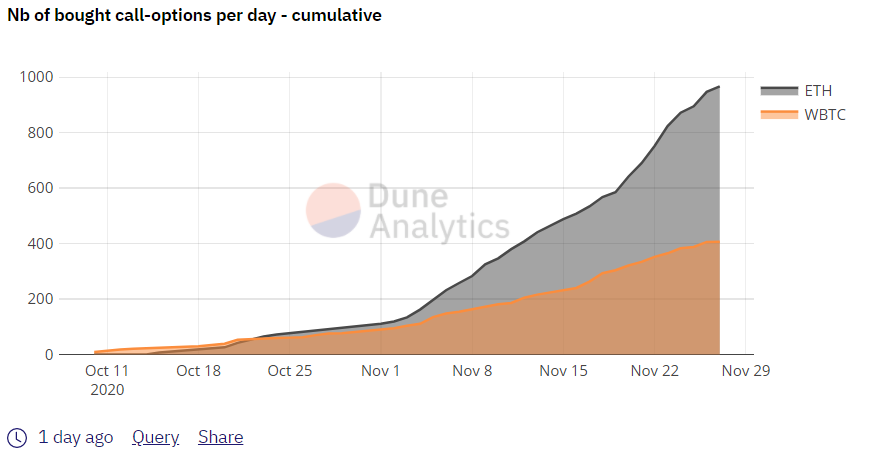
I'm long $HEGIC, but I've never said why
Let me do so now
$HEGIC = an options protocol
[Notice the word "protocol"]
More 👇
Let me do so now
$HEGIC = an options protocol
[Notice the word "protocol"]
More 👇
<
annoying definition time:
options are a way to hedge or protect your investments in things like $BTC and $ETH
or to make leveraged bets on big price moves...
translation, they are advanced tools for chads-squared
/>
2/x
annoying definition time:
options are a way to hedge or protect your investments in things like $BTC and $ETH
or to make leveraged bets on big price moves...
translation, they are advanced tools for chads-squared
/>
2/x
$HEGIC offers options on $ETH and $wBTC atm
What excites me about it is this word: protocol
$HEGIC = a set of rules that enables the construction of an entirely new options ecosystem
It = scaffolding that other devs can build different financial tools and products on
3/x
What excites me about it is this word: protocol
$HEGIC = a set of rules that enables the construction of an entirely new options ecosystem
It = scaffolding that other devs can build different financial tools and products on
3/x
When I think of $HEGIC, I think of how Uniswap $UNI has revolutionized decentralized trading
& if you don't think Uniswap has revolutionized decentralized trading, read this:
4/x
& if you don't think Uniswap has revolutionized decentralized trading, read this:
https://twitter.com/redphonecrypto/status/1328074950465495044?s=20
4/x
People call Uniswap a peer-to-peer trading platform, but that's not really accurate
When you route a trade through Uniswap, you're not trading directly with another peer
You're trading against a pool of liquidity that's locked into a smart contract
5/x
When you route a trade through Uniswap, you're not trading directly with another peer
You're trading against a pool of liquidity that's locked into a smart contract
5/x
That's why people call it a peer-to-contract or peer-to-pool protocol
When you trade against a pool, you solve a lot of problems
you don't have an annoying ass orderbook
you don't have to wait for another bloke to be on the other side of your trade
6/x
When you trade against a pool, you solve a lot of problems
you don't have an annoying ass orderbook
you don't have to wait for another bloke to be on the other side of your trade
6/x
you can trade against the pool whenever tf you want
That's spawned all sorts of innovations
(to name a few: LP tokens that can be lent out or used for farming... liquidity migration... dex aggregation, etc)
7/x
That's spawned all sorts of innovations
(to name a few: LP tokens that can be lent out or used for farming... liquidity migration... dex aggregation, etc)
7/x
Basically, Uniswap makes it possible to trade whatever token you want at any time
$HEGIC = the same for options
It's a protocol that makes it possible to trade options instantly... no KYC, no orderbook, no waiting for another trader to take the other side of your bet
8/x
$HEGIC = the same for options
It's a protocol that makes it possible to trade options instantly... no KYC, no orderbook, no waiting for another trader to take the other side of your bet
8/x
Once you have that, you have a scaffolding for innovative products in options
In order to be useful, $HEGIC needs deep liquidity. It gets it through incentives
Again, Uniswap is a good example (this is all grossly simplified, but it does the job):
9/x
In order to be useful, $HEGIC needs deep liquidity. It gets it through incentives
Again, Uniswap is a good example (this is all grossly simplified, but it does the job):
9/x
People deposit cryptos into Uniswap pools because they can earn trading fees on them
People deposit cryptos into $HEGIC pools because they can earn fees on them
10x
People deposit cryptos into $HEGIC pools because they can earn fees on them
10x
Now, we all suspect that eventually Uniswap will begin charging a fee to traders, and it will distribute that fee to $UNI holders
Hegic is already doing that, kicking out fees to $HEGIC stakers
11/x
Hegic is already doing that, kicking out fees to $HEGIC stakers
11/x
You buy $HEGIC, you stake it on the website or through something like $zLOT @zLOTFinance and you start collecting $ETH or $wBTC as other trade options on the protocol
Tons of other reasons to be bullish on $HEGIC's growth:
- Adding more tokens beyond $ETH and $wBTC
12/x
Tons of other reasons to be bullish on $HEGIC's growth:
- Adding more tokens beyond $ETH and $wBTC
12/x
- A secondary market for Hegic's options
13/x
https://twitter.com/HegicOptions/status/1329853100845314054?s=20
13/x
- Secondary use cases for pooled liquidity?
- Sweet teasers from Molly
14/x
- Sweet teasers from Molly
https://twitter.com/0mllwntrmt3/status/1332677238651817985?s=20
14/x
- Already big signs of product market fit (a $5 million order anyone?)
15/x
https://twitter.com/HegicOptions/status/1330973366342340615?s=20
15/x
- And most tantalizing... a possible (likely?) integration with Yearn / $YFI
17/x
https://twitter.com/defislate/status/1329429888206577666?s=20
17/x
tldr if you look at $HEGIC like one of many VC-funded "options platforms" out there, you're thinking too small
it will not be a cute little walled garden
it will not be a reinvention of centralized options
it is hunting out tradfi options solutions + crushing bones
it will not be a cute little walled garden
it will not be a reinvention of centralized options
it is hunting out tradfi options solutions + crushing bones
• • •
Missing some Tweet in this thread? You can try to
force a refresh




